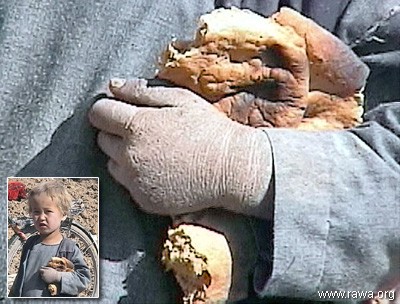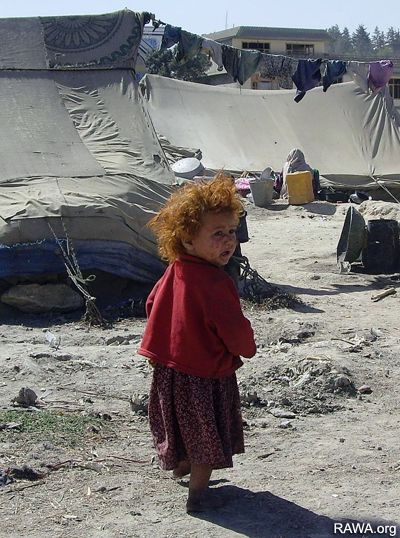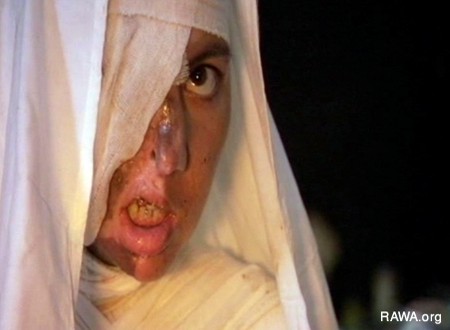By Borhan Younus
A man in his thirties suddenly threw himself on a busy road in Kabul and yelled, "kill me and drive over me."
"They can't feed us; the easier way is to kill me and my children. Oh people, for God's sake, come and kill us," shouted the apparently exhausted man lamenting the government's failure to provide him with a livelihood.

Bodyguards of a former commander, disembarking from a luxury Jeep, were the first to respond to his call by kicking and hitting him with the butts of their Kalashnikovs. The armed men then dragged and removed him off the road. In utter disappointment, the man, in shabby cloths, started weeping like a child.
Misery-Stricken
Beggars are the prime feature that draws the attention of tourists and foreigners who come out to the streets of Kabul.
This is not the only way adopted by the misery-stricken people of this impoverished country to express their feelings about the awful circumstances they are passing through every day.
When one goes shopping in the markets or walks in the streets of the Afghan capital, Kabul, he has to face swarms of beggars, old, young, burqa-clad women, and underage children, asking for alms money. A shopper has to talk to beggars more than anybody else while moving from a shop to a shop or from a street to a street of the capital city. Others, mostly disabled during the three decades of war and civil strife, have adopted a novel and more attractive way of begging—sitting in the middle of a road and displaying the chopped parts, usually hands or legs, of their body to attract the sympathy of the passers-by and motorists.
This is the prime feature that draws the attention of tourists and foreigners who come out to the streets of Kabul. No sooner do the guests step out of the hotels and restaurants, the unwelcoming beggars, mostly children and women, surround them and start murmuring different prayers in their local dialects, mostly Pashto and Dari. The beggars are rarely given any positive response.
Afghans are traditionally proud of their self-reliance. They are well-known for their tradition of hospitality which means that they always love to credit others and keep others in high esteem.
However, this sense of pride among the people of this nation is fading away because of a government that is begging before the international community every now and then. The incumbent Afghan government has always been seen holding the bowl before every visiting foreign dignitary asking for "more assistance". This bagging hand and reliance on aid is contrary to the traditional proud spirit of Afghans. What matters for the US-installed government is to obtain aid from the Western governments without caring for the price it has to pay in exchange.
I vividly remember when President Hamid Karzai was on a tour to Copenhagen last year to attract support and assistance from Denmark. His visit coincided with the beginning of the row over the publication of the blasphemous cartoons of Prophet Muhammad (peace be upon him).

UNICEF, Oct.26, 2007: "Afghan children on the brink of catastrophe"
Karzai told reporters that the stance of the Danish newspaper and government on the cartoon's issue was understandable and completely convincing to him as a Muslim. These comments came at a very sensitive time when millions of Muslims were pouring into streets to condemn Denmark for its folly.
It was impossible for President Karzai to object the policies of his backers, especially in return for aid. Thereby, stuck between two options, whether to defend Islam's precious values in a very sensitive time or to surrender to his donors' demands, Karzai chose the second, proving that "beggars can't be choosers".
Billions in Aid, No Change
Although the government has not stopped begging from any source be that at any price, and has already got in aid more than 12 billion dollars, this huge aid has yielded no real change on the ground. Despite all propaganda by the Western media and the beneficiaries, lives of ordinary Afghans have worsened under the US-backed government compared to the Taliban era conditions.
Poverty, the phenomenon of beggary and losses of human lives, which the Westerners ironically term as collateral damage, have reached climax over the previous six years. In such a situation, the unprecedented huge amounts of foreign aid could not bring any considerable changes to Afghanistan.
Whatever has been done in terms of renovation and reconstruction of major cities is due to massive investment by Afghan and foreigner investors, and not by the money given as aid to the Afghani government.
The biggest manifestation of change and development could be seen only in cities where high-rise stores, fashionable markets, and luxurious hotels have been built. But this just benefits the private investors and foreigners involved in the business.
There is less interest in investing in projects of long-term benefit to the country, such as launching factories, rebuilding the nation's infrastructures, and taping of the country's natural resources.
Both investors and top government officials, who mostly have come from the West, are living like guests and have no intention to stay here for long. Even some ministers did not give up their foreign nationality and did not bring their families from abroad. They are sure that they have nothing to do with future of this country apart from their present personal interests. They are sure that they will leave or will be forced to leave as soon as the foreign occupation forces pull out of Afghanistan. Nobody in the government or among the investors really wants to rebuild this war-torn country.

"In Afghanistan, 28 million people are free. They have their own president, they have their own parliament. Improved a lot on the streets," Donald Rumsfeld says in the October issue of GQ magazine.
AP, Sep.10, 2007:
RAWA: He is probably right, Afghan women are free to commit self-immolation and beg in the streets, warlords are free to commit any crime, kidnap and rape women, loot people and do drug business. We have a parliament full of drug-lords and human rights violators, we have a president who is called by media as "mayor of Kabul". (According to UNIFEM, 65% of the 50,000 widows in Kabul see suicide as the only option to get rid of their miseries and desolation - Isn't it a real FREEDOM?!)
Nobody knows what happens to the billions of dollars in aid and where this money is being spent. The answer could be found when you ask about the ownership of many of the lavish stores and hotels in the city. Most of them belong to the government's bigwigs, former Mujahideen leaders, and a clandestine circle of mafia. When somebody is appointed to a high-level government job, he starts as ordinary man, but when he leaves the job, his kitty is bulging with money and he becomes a trader, a big investor, or at least has got bank accounts abroad. This fact can give an answer to where the money, begged in the name of this proud nation, goes.
Another exit for the money is the presence of overwhelming number of non-governmental organizations (NGOs). The international donors do not trust the corrupt Afghan government, alternatively they pass the money to NGOs, most of them run by foreigners. NGOs, for their part, often spend most of the aid money on their personal needs, transportation, holidays, high staff salaries and renting comfortable guesthouses and offices. A small portion of the aid is thereby spent on improving the lives of Afghans.
Worsening Situation
The corrupt government, huge amounts of aid misused by a particular section of people, and the presence of foreign forces have all together contributed to the doubling of the miseries of the common Afghan.
Prices of basic items have soared up and are still on the rise, ratio of unemployment is going higher and higher, and the real income level is going down. For example, during the Taliban era, one loaf of bread was sold for 3 Afghanis, now its price has doubled. One liter of petrol was sold for 11 Afghanis, now it is over 50 Afghanis. Similarly, one kilogram of liquefied gas was sold for 20 Afghanis, but now it is over 60 Afghanis. Prices have increased manifold, but the income of the common man has dropped.
Residents of Kabul enjoyed at least 12 hours electricity six years ago, but now it decreased to four hours. Kabul is perhaps the only capital in the world living in blackout. The roads of the heart of the capital have not been asphalted, but they have further damaged. This is the case in the capital, Kabul, which is often depicted as a success story of the post-Taliban Afghanistan. The situation is far worse in the countryside and the provinces.
Poverty and deterioration of daily life is not the only fact contributing to the common Afghan's increasing disappointment and lose of trust in the government. One other reason that make people turn against the incumbent regime is that its 'international friends', a term used here for the occupying forces, are relentlessly turning against the civilians.
"Kangaroos Are More Important"
Many locals wonder here whether they were cared about less than animals by the 'international friends'. A newspaper recently referred to mass murder of Afghans in a bombing by the foreign forces with no regret as gallows humor:
"A special team of the United Nations has recently opened investigation into killing of seven mountainous Kangaroos in a zoo in the Democratic Republic of Congo. This gives a high importance to the life of animals, we Afghans wish we could have that much respect from the United Nations and other human rights organizations. Killing of dozens of civilians in bombing by NATO and US troops, especially in the southern parts of Afghanistan, has now become a routine in this unfortunate country. Many more are maimed, orphaned and widowed. But the champions of human rights and democracy are soliciting Afghans by offering them a few notes for the blood of their near and dear ones."
The United Nations is, on the other had, running out of words when reports about the ruthless bombing of arrogant American and NATO troops reaches to Kabul from a remote village in Helmand, Kandahar, Uruzgan, Zabul, Paktia, Paktika, Khost, Nangarhar, Laghman, Kunar, Nuristan or Kapisa.
In such a situation, the international community must not be taken by surprise if overwhelming number of Afghans are joining Taliban or becoming members of the suicide squads of al-Qaeda. The phenomenon of suicide bombing is alien to this proud nation, but they deem it fit to cut off the link between their body and soul at once instead of dying in bits.



